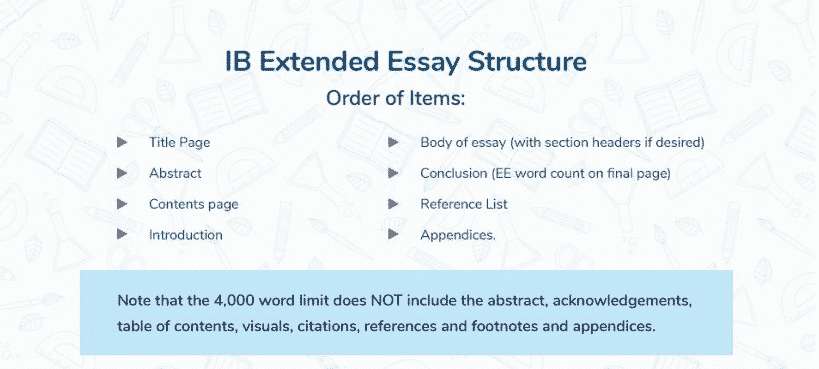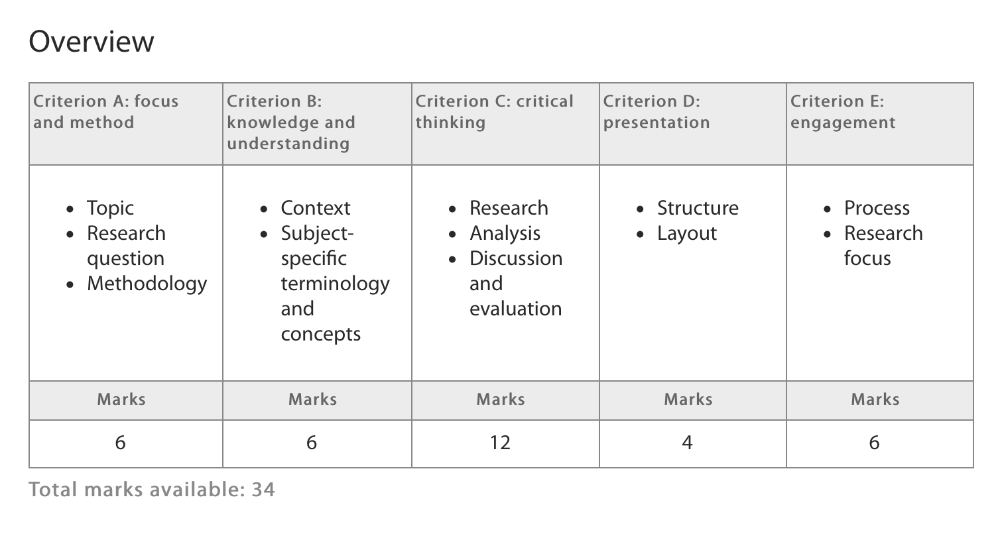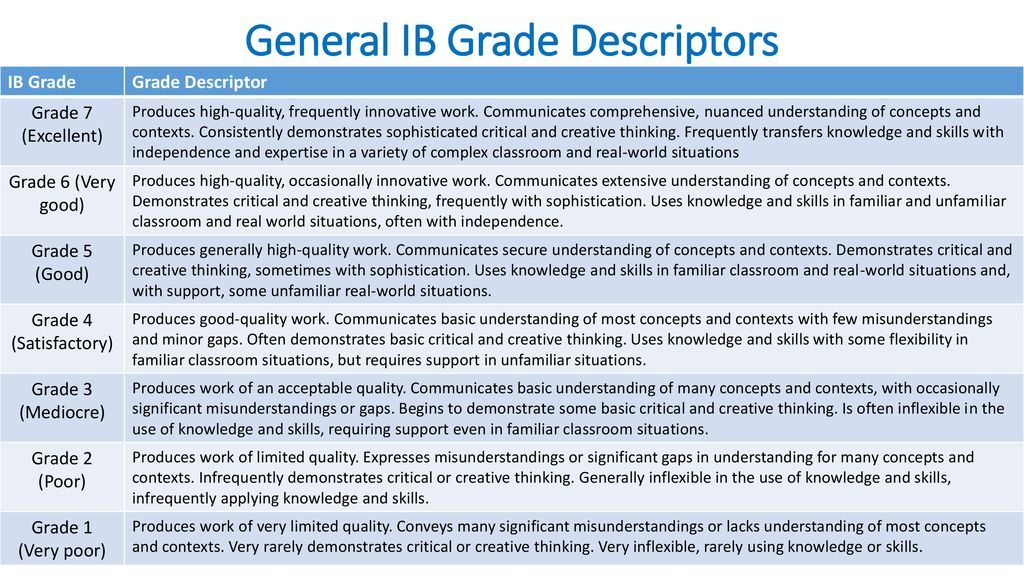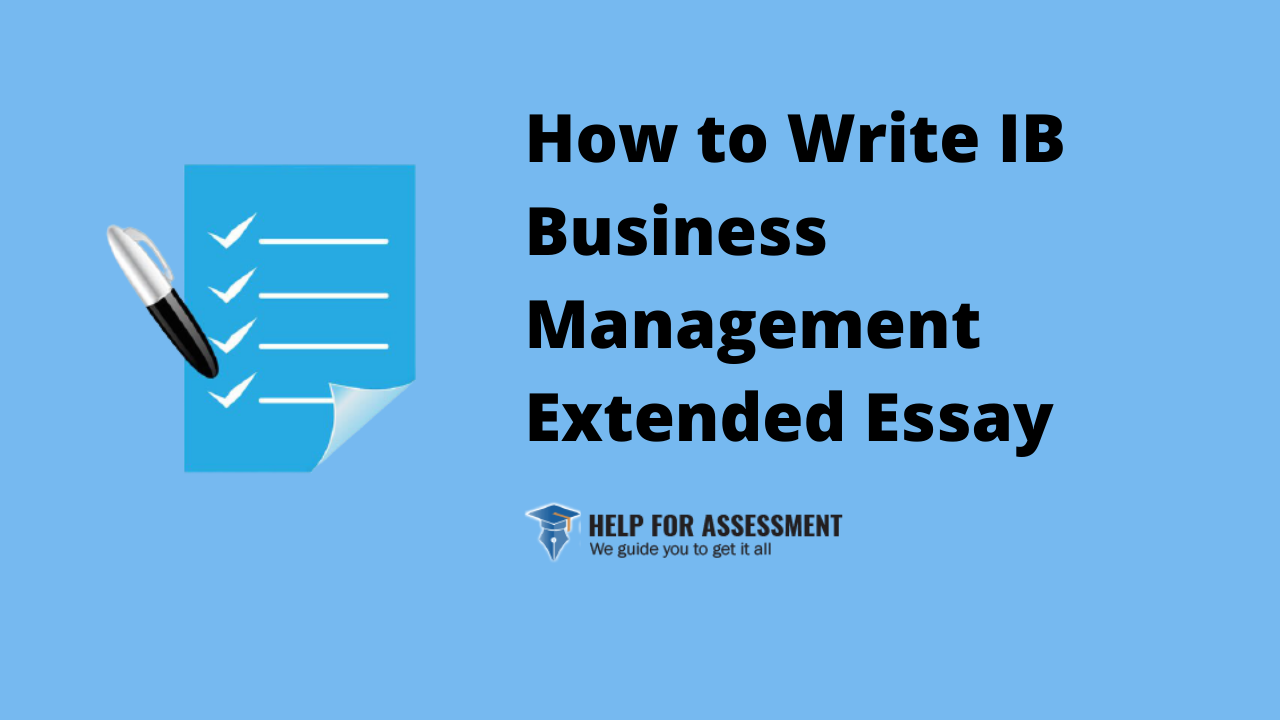The extended essay in business management requires you to demonstrate your ability to analyze commercial activities at different economy levels.
A business management extended essay requires you to choose a topic, develop a research question, conduct in-depth research, and write a critically analyzed argument with credible data and evidence.
In this guide, we look at the research question, structure, assessment criteria, grade descriptors, and tips you can use to write a high quality EE report in business management.
Research Question
An extended essay research question is important because the entire business management report hinges on it.
A good RQ for this report should align with the scope, concepts and techniques, research materials, usefulness and application, and engagement in the subject.
1. Focus on the Scope of the Topic
Scope refers to the breadth of the topic you choose.
Don’t select a topic that lacks sufficient materials to cover the 4,000 words limit. Instead, select a highly specific business management EE topic, one for which you can find sufficient information to write a more comprehensive report.
Then come up with a research question that aligns with it.
2. Apply Business Concepts and Techniques
Develop a research question for which you can apply business analysis methods, terminologies, and techniques you’ve learned in the classroom.
Ensure the question has a tight link to the syllabus while allowing you to draw direct link to theoretical concepts taught in the business management course.
Your task here isn’t to show off your knowledge. Your teacher expects you to prove you understand and can apply what you’ve learned.
3. Ensure Availability of Research Materials
Ignore a research question that lacks depth of materials and knowledge base to warrant a 4,000-word treatment.
If you can’t access highly relevant records or useful research data for the question, look for a different one.
4. Make Your RQ Useful and Applicable
Ensure your RQ, or issue, is relevant and applicable to the current business environment.
You must draw your inspiration only from journals and newspapers that give you current ideas.
5. Make Your Research Question Engaging
Don’t develop a research issue based only on the merit of ease and personal interest.
Focus on something you’ve actually investigated or have always wanted to research. By doing so, you’ll have an easy time fulfilling the engagement part of the grading criteria.
IB Business Management Extended Essay Structure
The structure of a business management extended essay features a title page, table of contents, introduction, methodology, body, conclusion, and bibliography.
Title Page
The title page doesn’t contribute to the overall world count of the EE. However, the title page is an import part of the structure because it includes the following significant information:
- Title: It should not be a question but a clear, summarized statement of the research question.
- Research Question: Write the RQ in this part.
- Subject: The subject should be “Business Management”.
- Word Count: Indicate the number of words in your essay.
Don’t write your name, candidate name, date, or school name on the title page, as they’re no longer part of the new structure.
Table of Content
Table of contents is also not part of the word count, but it’s an essential part of the assignment. Include all the parts of your business management EE in this section with their respective page numbers.
Introduction (About 250 Words)
Your introduction should provide a clear context for your research question.
- Describe why your research is interesting, as well as why it’s important to your audience.
- Ensure your audience understands what you’ll be exploring, how you intend to explore your research question, and how valuable your research is to them.
Methodology (About 350 Words)
Divide the methodology in two parts, one for the source and one the other one for the tools. Also, ensure you mention the limitations and drawbacks of these sources and tools.
- Sources: State and explain the primary and secondary sources of your research. The sources can include news articles, company annual reports, magazine articles, and encyclopedia. Include the benefits and drawback of each source, keeping in mind that a majority of your research should come from secondary sources.
- Tools: State the tools you’ll use for analysis, discussion, and evaluation. Explain why you’re going to use these tools and how relevant they’re to your business management assignment. Mention any changes to your toolset should there be any, along with an explanation on why such changes were necessary.
Main Body (About 2800 Words)
The main body of the business management extended essay is at most 2,800 words long. It’s in this section that you share your research, analysis, discussion, and evaluation.
Divide the main body into two sections, one for the tools and the other for your research:
- Tools: Show your teacher you know how to do what you’ve learned in a business management class.
- Research: Make an impression with your research, even if it goes beyond what you’ve learned in the classroom.
Each paragraph should relate to the research question. Therefore, the analysis, discussion, and evaluation have to include relevant tools and research.
Conclusion
The conclusion ties everything together to show what you’ve done to answer your research question. Mention the limitation of your research and explain any other unresolved question.
However, the conclusion of your EE shouldn’t introduce new ideas (ideas you haven’t addressed in the body parts of the essay.
Bibliography
Aim for 3 or 4 pages of sources for the bibliography. However, keep in mind that the bibliography isn’t part of your word count.
Business Management EE Rubric
IB evaluates business management extended essays based on the following 5 criteria:
- Focus and method
- Knowledge and understanding
- Critical thinking
- Presentation
- Engagement
The grades range from A to E, with the top grade having a maximum of 34 points and anything worse than a C being a fail.
While the professional judgment of selected instructors can affect your grades, these descriptors used to determine the actual grade that you get in the end.
Criterion A: Focus and Method
Criterion A examines how unique, focused, intelligent, and analytical you’re when using techniques learned in the course and outside the classroom.
Evaluators expect you to demonstrate your scholastic ability to apply theories in practical situations, come up with answers to you research issue, and offer a possible solution to the problem at hand.
To score a 6 for focus and method:
- Develop a clear, focused research question.
- Use secondary sources for topic research.
- Support your arguments with relevant, recent, and credible evidence or data.
- Develop a well-organized, logical methodology leading up to your conclusions.
Criteria B: Knowledge and Understanding
Knowledge and understanding focuses on not only how much you’ve learned in the course but also how well you can apply the concepts taught in class to the real world.
To show a business-oriented thinking, use business terminologies.
You can use abstract concepts in the paper, but you should also add thorough explanation your process using a simple language that readers can understand.
Diagrams and charts can help explain concepts that would be hard to explain in words, but it’s important to explain each so that your ideas are clear.
As you explain business trends linked to your research topic, ensure your ideas follow an analytical process while remaining grounded in the case you’re exploring.
Criteria C: Critical Thinking
To score high on this criterion, show a unique application of business concepts, technique, theories, and methods to analyze the problem under investigation.
- Back your argument with in-depth, credible research.
- Be self-critical, making sure you evaluate the accuracy and reliability of your sources.
- Comment on the gaps or weaknesses your arguments don’t solve and suggest what you think researchers can do to solve these issues.
- Use the analytical techniques learned in the course to follow up every point you make in your business management extended essay.
Criterion D: Presentation
The presentation criterion looks at how well you organize and communicate your ideas. The common academic standards evaluated include:
- A clear and easy to understand language
- Clearly labeled charts, graphs, figures, and images
- A well-structured essay with headings and subheadings
Criterion E: Engagement
Criterion E evaluates how you engage with the research topic based on the subject’s intersection in your life.
Avoid using a third-person perspective because doing so will earn you few points.
Quite instances of personal interactions instead, and show that the research question you choose is relevant to you and others.
Extended Essay Grade Descriptors
The following are the grade descriptors used for IB Business Management Extended Essay:
Descriptor A
To get an A, you must have a clear research question, conduct relevant research, and demonstrate expert knowledge and understanding of the materials taught in the classroom.
Also, show a comprehensive engagement to and explanation of the problem.
Your extended essay in business management should feature a logical, structural layout, include key reflections, and have relevant, accurate conclusions.
Descriptor B
To score a B, you need to demonstrate good knowledge of research, appropriate research skill, and a reasonable application of the business concepts and techniques learned in the classroom.
Also, offer a synthesis of an effective research question, a satisfactory presentation, and conclusion supported by evidence presented in the IB business management extended essay.
Descriptor C
Students who score a C for their extended essay in business management are those who display some knowledge and understanding of the key concepts involved, including reasonable application of the topic.
However, the essay fails to synthesize the research question, it offers descriptive instead of an evaluative discussion, there are errors in the arguments use, and structure used is poor.
Descriptor D
Business management extended essays that score a D reflect poor research that lead to a general focus.
Although the essay shows some relevant knowledge of the topic, the content is full of discrepancies and inaccuracies.
In addition to the lack of a logical structure and coherent readability, the essay lacks a critical evaluation of the topic and the conclusions are inconsistent.
Descriptor E
An E is the grade awarded to an unclear essay with an unsystematic approach. The essay lacks a clear focus because it portrays limited knowledge of key concept, not to mention it has an inconsistent analysis and an inaccurate conclusion.
Tips to Write a Compelling IB Business Management Extended Essay
1. Choose Your Research Question
The research question for your IB Business Management Extended essay should not be practical or actionable.
This is applicable only in the Internal Assessment.
Also, make your research question focused, not too broad and not to narrow. While you should be asking relatively simple questions, make sure they aren’t too obvious.
2. Formatting Your Work
Your IB teacher will also look into how you format your work. So it’s important to make sure you get this right from the start.
Use the Times New Roman font type and 12-point font size. Double space your work and make sure every page has a number.
3. Citing Sources
You need to cite all the sources you use in writing your IB Business Management Extended Essay. You can use any citation format, but it’s preferable to MLA.
And don’t worry if you find citing sources somewhat confusing. Our guide on sources and citation should be enough to point you in the right direction.
4. Sticking to the Word Count
Your piece of research should not exceed 4,000 words.
Even if you feel like you have a lot to write to make your ideas clear, you should trim down during revision if your work is more than 4,000 words already.
5. Write a Great Reflection
The reflection for your IB Business Management Extended essay is not only important as the other parts of the assignment.
It’s also about 18% of the total grade. So you should give it your best shot.
6. Edit Your Work Thoroughly
Reading a 4,000-word IB Business Management Extended Essay after spending so many hours writing it can be rather boring and much less time consuming.
But doing so is the only way to make sure your essay is good enough for submission and ready for marking.
- Look out for grammar and spelling mistakes and fix them. Use a tool such as Grammarly to make your work easier
- Rewrite longer sentences, making them short and concise.
- Don’t hesitate to trim down word count in a sentence if you can say the same thing but in fewer words
- Do parts of your essay sound redundant? Delete them, regardless of where they appear in the essay
- Have you used a source you haven’t cited? Go back and fix the error
Editing your work thoroughly isn’t the fun part of working on an IB Business Management Extended Essay. However, it goes a long way to make your essay read better.
Can I Buy a Business Management Extended Essay Online?
You can buy an extended essay on Help for Assessment and one of our top writers will work on it from start to finish. We focus on in-depth research, proper structure, custom writing, in-depth editing, and timely submission.
Our writing services are affordable, and it’s not an exception for the extended essay in this subject. You pay as low as $12.99 to $40 per page depending on the urgency. There’s even a 10% discount for customers new to Help for Assessment.





